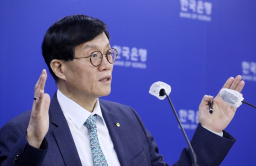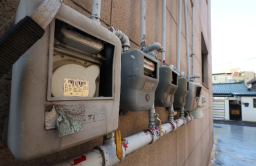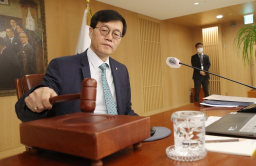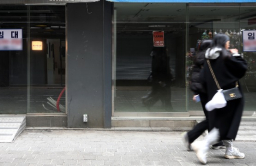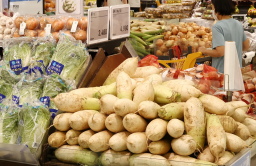-
KOSPI 2577.27 -2.21 -0.09%
-
KOSDAQ 722.52 -7.07 -0.97%
-
KOSPI200 341.49 +0.02 +0.01%
-
USD/KRW 1396 -2.00 0.14%
S.Korea confirms easing inflation; BOK to hold rate
Economy
S.Korea confirms easing inflation; BOK to hold rate
Government may soon unveil steps to boost domestic demand; SVB crisis reinforces expectations that central bank will leave rate unchanged
By
Mar 17, 2023 (Gmt+09:00)
3
Min read
News+
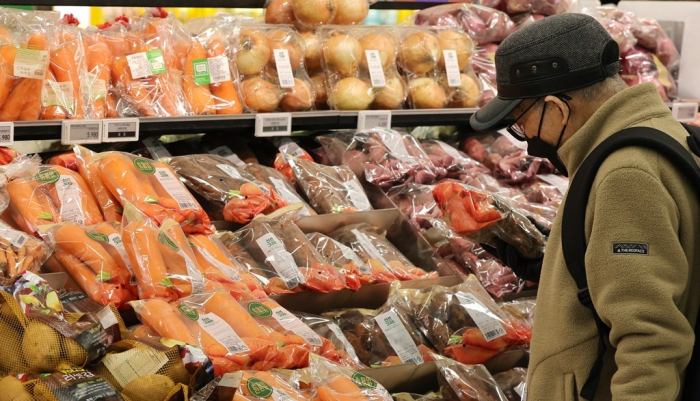
South Korea confirmed that inflation eased while Asia’s fourth-largest economy continued to slow, adding to expectations that the government may take measures to boost growth and the central bank may not raise interest rates further.
“While inflation has recently eased, the recovery in domestic demand has moderated,” said the Ministry of Economy and Finance on Friday in its monthly economic assessment report, called the Green Book. “With exports staying sluggish and manufacturers’ business sentiment contracting, the trend of an economic slowdown has continued.”
It was the first time for the ministry to say that inflation slowed in the report since last February when Russia’s invasion of Ukraine started sending consumer prices in Korea sharply higher. Prices soared by 6.3% in July 2022, the fastest rate since the 1997-98 Asian financial crisis.
Rampant inflation has gradually lost steam since then, easing to 4.8% in February, the slowest pace in 10 months, although still far above the central bank’s long-term target of 2%.
Finance Minister Choo Kyung-ho last week said he expected inflation to decline further to the low-to-mid 4% level in March and 3% level in the second quarter.
ECONOMY REMAINS SLUGGISH
The ministry said in the Green Book for the second straight month that the economy continued to slow, suggesting the government may focus more on economic growth policies.
“We will go all out to vitalize the economy in areas such as exports and investments,” said the ministry in the report.
This was the same strategy outlined in the previous Green Book, in which the government assessed that the economy slowed for the first time since June last year when it first flagged a possible economic slowdown.
The ministry’s pledge in the latest economic report suggested that the ministry may unveil measures to boost domestic demand in the near term, according to a government source.
Choo on March 9 said the presidential office shared concerns over domestic demand.
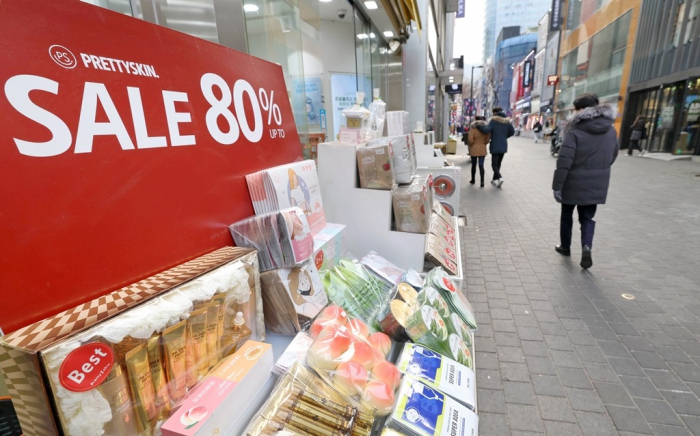
NO MORE RATE HIKES
The Bank of Korea is more likely to keep up interest rate hikes as worries about an economic slowdown grow amid woes over the potential crisis in the US and European banking sectors.
The BOK has already ramped up its policy interest rate by 3 percentage points to 3.5% since August 2021. The hikes were estimated to have slashed inflation by a combined 1.3 percentage points and growth by 1.4 percentage points, according to the central bank.
But it is unlikely to tighten monetary policy further, given unexpected external factors, especially the collapse of Silicon Valley Bank (SVB), analysts said.
The Federal Reserve is expected to raise its benchmark interest rates by just 25 basis points (bps) next week with some forecasts of a cut later this year. The European Central Bank on Thursday jacked up its three policy rates by 50 bps but dropped forward guidance, stoking views that its hawkish stance may have been eased.
Samsung Securities Co. expected the BOK to maintain the base interest rate at the current 3.5% by year-end, changing its earlier forecast of one more hike to 3.75%.
“The unexpected SVB crisis heightened vigilance against financial instability, while expectations for the Fed’s terminal rate were lowered,” said Kim Jiman, a senior analyst at Samsung, referring to the point where the federal funds rate is predicted to climb before it is trimmed back.
The BOK is unlikely to shift its policy stance to easing as the monetary authority continues pledges to curb inflation, analysts said.
Central bank policymakers also defied calls for an interest rate cut this year.
“We have never considered a pivot,” BOK Monetary Policy Board Member Park Ki Young told reporters on Thursday, referring to a monetary policy shift. “We have no choice but to stick to our mandate of price stability and financial stability in the current situation.”
BOK Governor Rhee Chang-yong said earlier this month it was premature to discuss a cut despite growing risks of a recession, as inflation has yet to slow enough to justify such a policy shift.
Write to Eui-Jin Jeong and Mi-Hyun Jo at justin@hankyung.com
Jongwoo Cheon edited this article.
More To Read
-
 PerspectivesUS bank failure triggers Asia’s 2008 PTSD
PerspectivesUS bank failure triggers Asia’s 2008 PTSDMar 15, 2023 (Gmt+09:00)
-
Mar 08, 2023 (Gmt+09:00)
-
Mar 06, 2023 (Gmt+09:00)
-
Feb 23, 2023 (Gmt+09:00)
-
Feb 17, 2023 (Gmt+09:00)
-
Aug 02, 2022 (Gmt+09:00)


